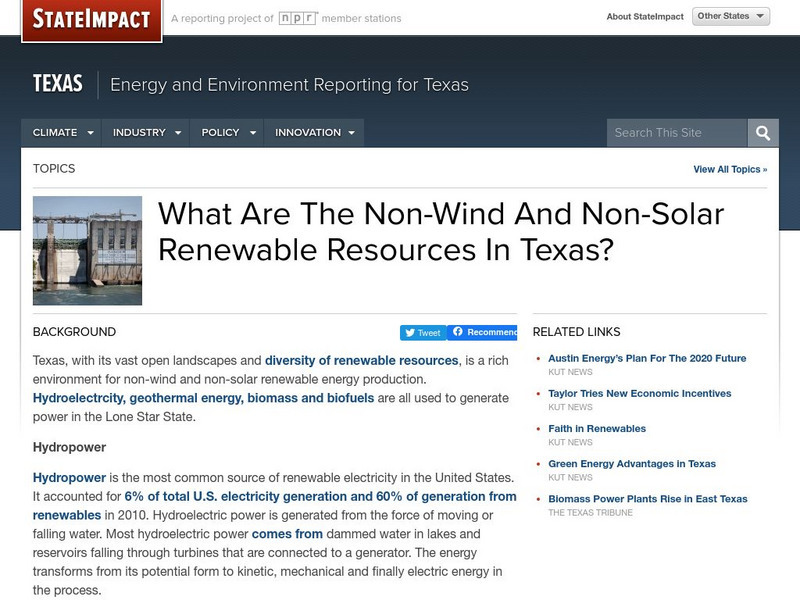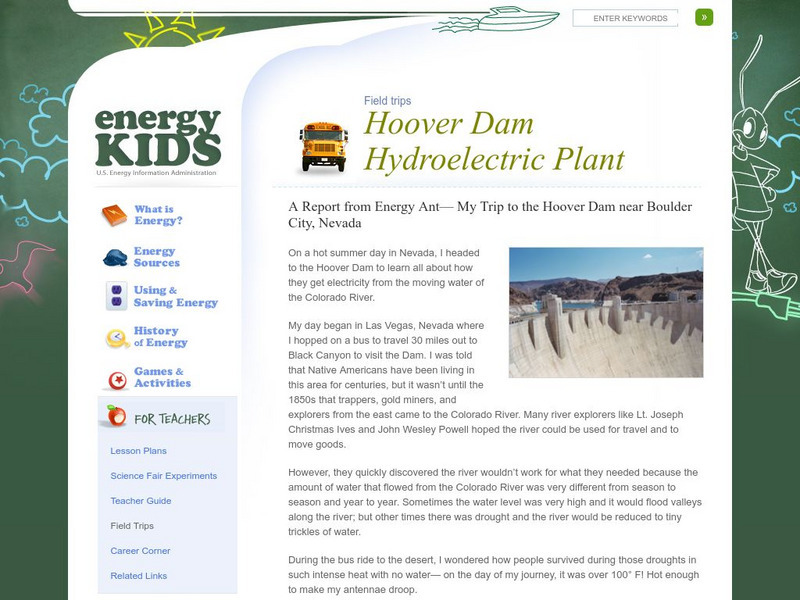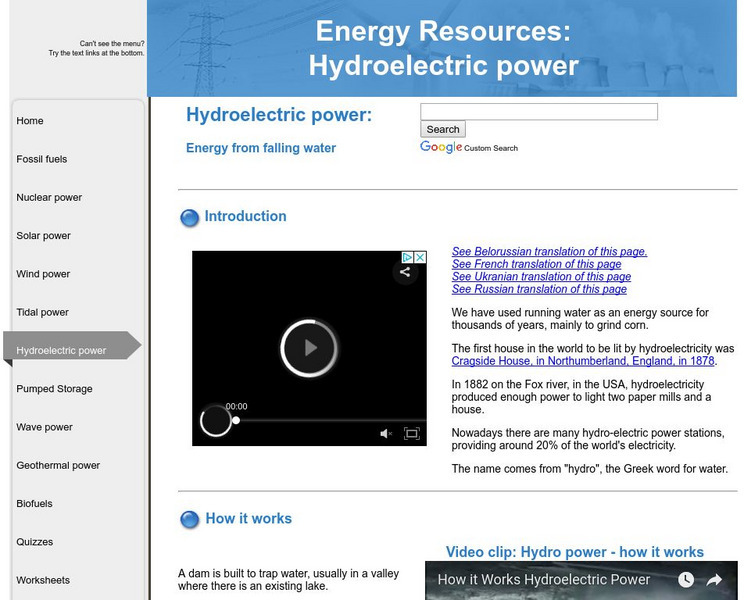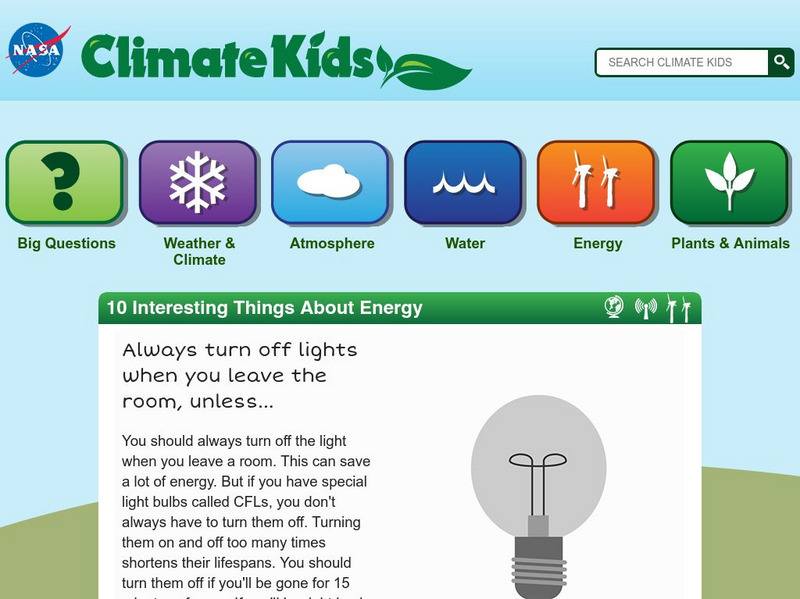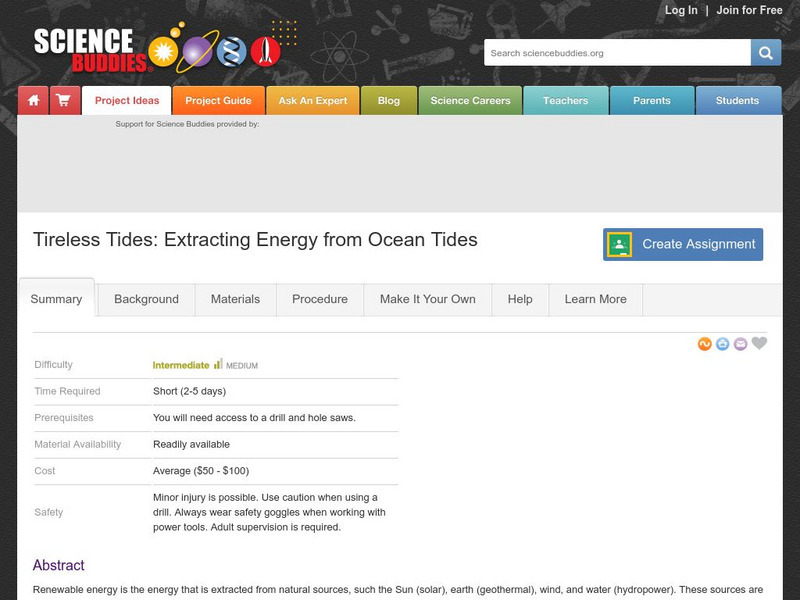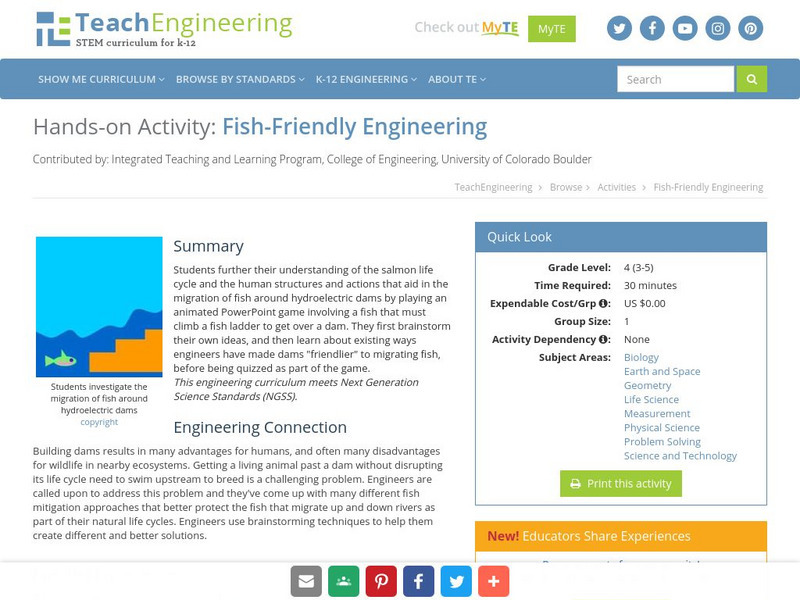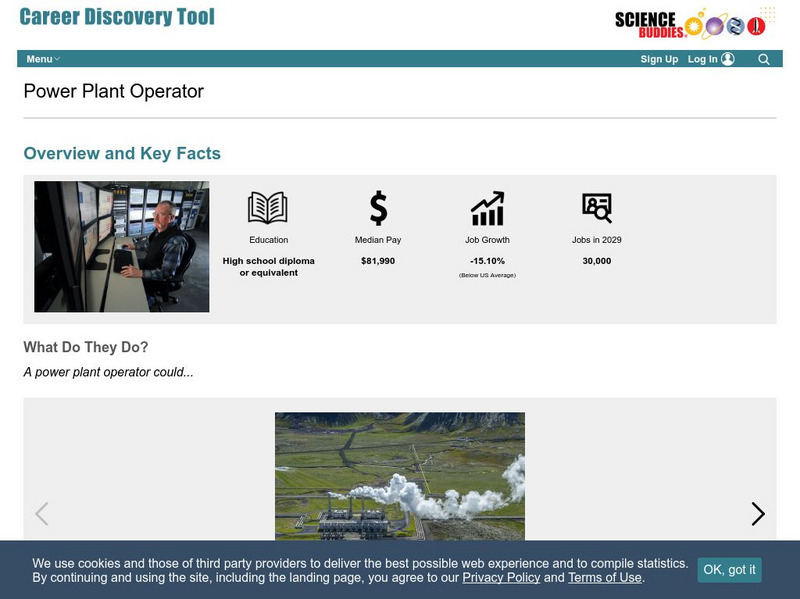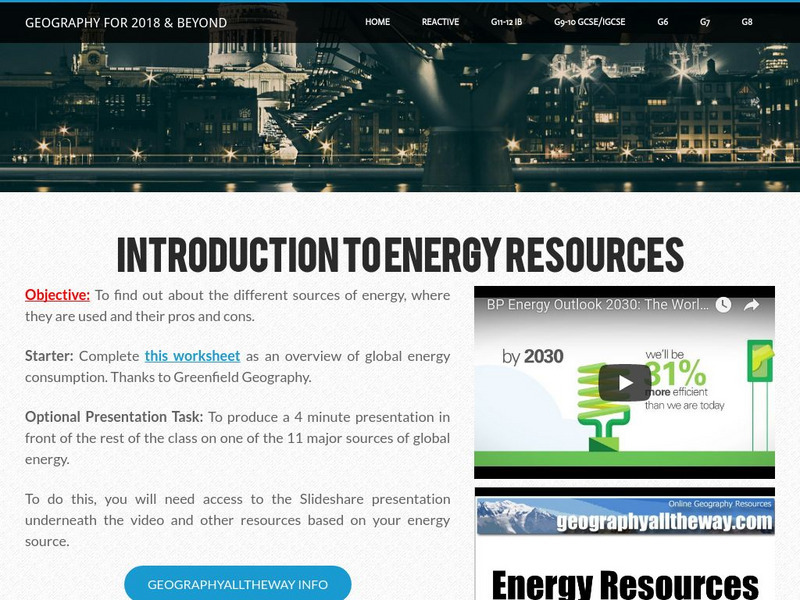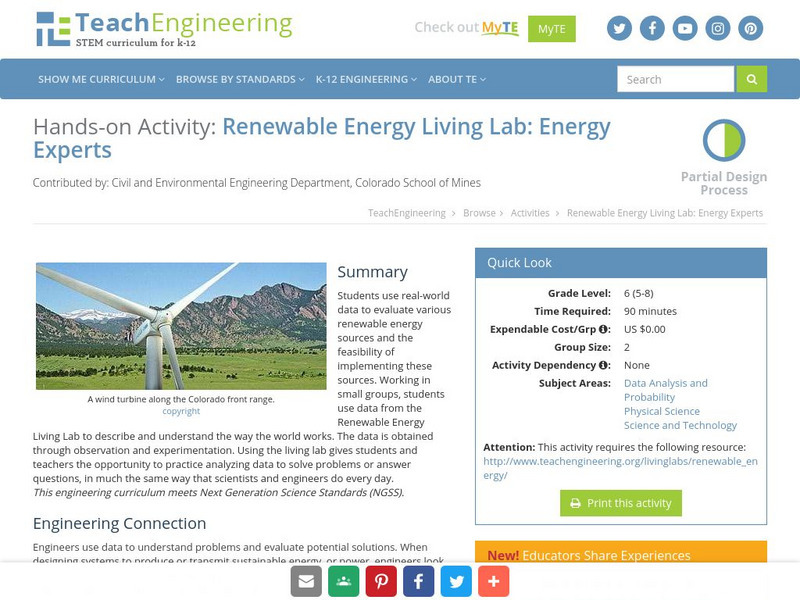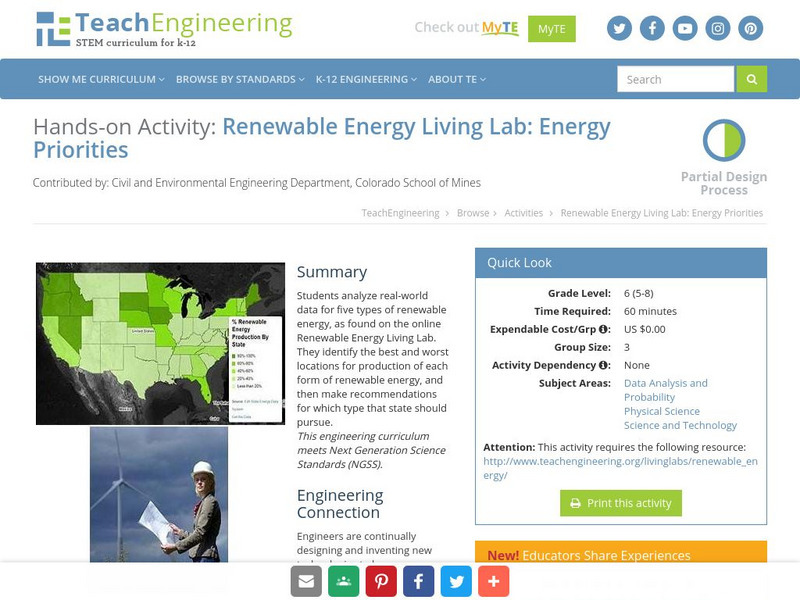Virtual Museum of Canada
Virtual Museum of Canada: Community Stories: Powering Up Rural Manitoba
The spread of hydroelectric power across the Manitoba prairies and its impact on rural communities is profiled. Archival photographs, the introduction of new electrical appliances, and the major changes to rural life are included.
NPR: National Public Radio
Npr: What Are the Non Wind and Non Solar Renewable Resources in Texas?
An overview of renewable energy resources in Texas, aside from wind and solar energy. Covers hydropower, geothermal energy, and biomass.
US Energy Information Administration
U.s. Eia Energy Kids: Hoover Dam Hydroelectric Plant
Take a virtual field trip with "Energy Ant" as he visits Hoover Dam. Discover when it was made, how big it actually is as well as take a trip to view the giant generators.
Other
Ucs: How Hydrokinetic Energy Works
Description of how hydrokinetic power works including resource, conversion, and environmental issues.
Other
Energy Resources: Hydro Electric Power
Alternative forms of energy site showcases Hydro-electric power. Discover how it works, it's advantages and disadvantages as well as whether or not it's considered to be a renewable resource.
Missouri Botanical Garden
Missouri Botanical Garden: Rivers & Streams of the World
A great site from The Evergreen Project that provides information about watersheds, how a stream becomes a river, when rivers run into the ocean, longest rivers of the world and much more. There are also other sections of this site that...
Energy for Sustainable Development
Kids and Energy: Hydro Energy
Hydropower is a clean, renewable and reliable energy source which converts kinetic energy from falling water into electricity, without consuming more water than is produced by nature. Quite simply the oldest method by which renewable...
EL Education
El Education: Renewing Our Future
After completing research and field-work, students create a calendar with photographs, illustrations, and information about four different types of renewable energy: solar, wind, hydropower, and biomass.
NASA
Climate Kids: 10 Interesting Things About Energy
Discover 10 very interesting things about energy, including conservation, fossil fuels, daylight savings time, hydropower, wind energy, solar power, greenhouse gases and BTUs (British Thermal Units).
Science Buddies
Science Buddies: Tireless Tides: Extracting Energy From Ocean Tides
Renewable energy is the energy that is extracted from natural sources, such the Sun (solar), earth (geothermal), wind, and water (hydropower). These sources are renewable because they can be replenished by the same natural sources within...
TeachEngineering
Teach Engineering: Fish Friendly Engineering
Students further their understanding of the salmon life cycle and the human structures and actions that aid in the migration of fish around hydroelectric dams by playing an animated PowerPoint game involving a fish that must climb a fish...
TeachEngineering
Teach Engineering: Swim to and From the Sea!
Learners are introduced to the basic biology behind Pacific salmon migration and the many engineered Columbia River dam structures that aid in their passage through the river's hydroelectric dams. Students apply what they learn about the...
Other
Bc Hydro: Generation System
Gives a clear explanation of how BC Hydro's electric generation system and thermal generating system work. Its transmission and distribution systems are also explained. There are maps showing where facilities and dams are located, but...
TeachEngineering
Teach Engineering: Power Your House With Water
Students learn how engineers design devices that use water to generate electricity by building model water turbines and measuring the resulting current produced in a motor. Students work through the engineering design process to build...
eSchool Today
E School Today: Renewable Energy Sources
Learn what renewable energy is, the different types, and why it's important to conserve energy.
US Department of Agriculture
China's Agricultural Water Policy Reforms [Pdf]
"This report documents the problem of water scarcity in parts of northern China and describes China's agricultural water management policies as well as reforms underway to encourage water conservation." (USDA) (PDF Format)
Science Buddies
Science Buddies: Career Profile: Power Plant Operator
Keeping the power moving to houses and businesses is the job of the power plant operator. Whether the power comes from hyrdroelectric, nuclear, or coal energy, the power plant operator needs to know how to keep the turbines moving. This...
Geographypods
Geographypods: Theme 3: Economic Development: Energy Systems
This learning module looks at human-made systems of energy, covering different types of energy and power stations. Includes handouts, slideshows, maps, activities, photographs, an interactive animation, and videos.
US Energy Information Administration
U.s. Energy Information Administration: Azerbaijan
This interesting site talks about the natural resources in Azerbaijan. Read about this country's oil and natural gas reserves and the importance of these to the economy and politics.
Other
Lehigh University: Energy
An inquiry-based science unit for middle school students centered on the world's energy sources. The lessons integrate technology and lab activities while teaching about energy sources, production, and consumption.
US Geological Survey
Usgs: Water Use in the United States
This thorough site delves into how we use water on an everyday basis. Ground water, surface water, domestic use, commercial use, irrigation use, are just a few of the topics described on this site. Click Home to access the site in Spanish.
US Geological Survey
Usgs: Water Science for Schools Water Science Storytime!
This U.S. Geological Survey website features a fictious town, Dryville, and uses it to illustrate every aspect of water management that you might encounter. Click Home to access the site in Spanish.
TeachEngineering
Teach Engineering: Renewable Energy Living Lab: Energy Experts
Students use real-world data to evaluate various renewable energy sources and the feasibility of implementing these sources. Working in small groups, students use data from the Renewable Energy Living Lab to describe and understand the...
TeachEngineering
Teach Engineering: Renewable Energy Living Lab: Energy Priorities
Students analyze real-world data for five types of renewable energy, as found on the online Renewable Energy Living Lab. They identify the best and worst locations for production of each form of renewable energy, and then make...



